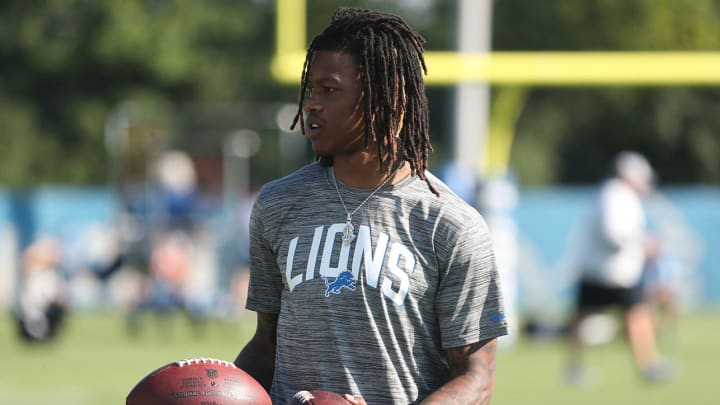The NFL Needs to Rewrite Its Extreme Gambling Policy

In this story:
One of the NFL’s driving principles is to take itself as seriously as possible, which is why team owners think they must watch games in formal wear, employees must refer to them as “Mr.” or “Mrs.” and football is relentlessly portrayed as a character-building exercise that is essential to the success of the American experiment. When a league assigns itself such weight, then naturally the people running it become Biblical literalists about the rule book (unless one of the owners might have violated a rule, but that’s for another column).
The rule that got Lions receiver Jameson Williams suspended for six games might be dumb, but it’s the rule, dammit, and if he gets away with a mild punishment, then before you know it, players might think they can decide how high they can pull up their game socks. Oh, the heresy!
Well, rules are rules, and Williams broke one. But if his agents at Alliance Sports are telling the truth—and let’s assume they are—it’s a ridiculous rule, and the next logical step for the NFL is to reexamine and then rewrite its gambling guidelines. Let common sense reign.
Williams’s agents say the Lions receiver did not bet on football. He just placed a bet on something else while on the clock, violating “a technical rule regarding the actual location in which the online bet was placed—and which would otherwise be allowed by the NFL outside of the club’s facility.”
To sum up: If you bet on the Lakers on your phone in the locker room, that’s a danger to the NFL. Walk outside and do it on the sidewalk, and you’re good.
That is unfair to cold-weather teams, but more importantly, it is colossally stupid—pro football’s equivalent of arcane laws that have been on the books since 1872 that are suddenly discovered and enforced. The NFL just suspended a key player on a potential playoff team for trying to milk a pig in a public square on Arbor Day, is what I’m saying, and even if you say, “Well, hey, Williams should have known the rules,” I’ll repeat that the rule is still colossally stupid. Why would Williams’s wagering pose a threat to the league only when he does it in the facility?
The obvious move now is to change the rules. The problem there is that the NFL will not want to change a rule it just enforced so firmly. That would be an admission that the rule it just enforced is, in fact, colossally stupid. This is what extreme self-seriousness begets. (The length of Williams’s suspension—six games—is also extreme.)
Whatever. Just change it. In fact, rethink all the gambling rules. The simpler and more sensible they are, the more likely people will follow them, anyway.
You would not believe how ridiculous some of these rules are. The NFL bans any “NFL personnel other than players” from “placing, soliciting or facilitating” any bet on any sport, ever. The NFL defines “NFL personnel” as pretty much everyone, from the general manager down to part-time game-day stadium workers.
Think about how absurd that is. Ushers can’t bet on hockey. Beer vendors can’t bet on Olympic rhythmic gymnastics. But if the starting quarterback wants to bet $1 million on the Padres, that’s fine—as long as he does it on “personal time” and not at the league facility.
Watch the NFL with fuboTV. Start your free trial today.
This is both obnoxious management overreach (what right does the NFL have to tell some hourly worker she can’t bet on other sports?) and nonsensical. The primary reason to have a gambling policy at all is to protect the integrity of the league. Secondary reasons could include protecting the league’s financial interests or (theoretically, I suppose) the safety of workers. This policy goes so far beyond reason.
Perhaps the NFL does not want anyone gambling on other sports because the NFL does not want anyone watching other sports. It wants everybody in America hyperfocused on the singular enterprise of pro football. But most Americans already seem to be. So rewrite the gambling policy. Limit it to gambling that would actually hurt the league. Then the NFL can avoid absurd announcements like the one it just forced itself to make.

Michael Rosenberg is a senior writer for Sports Illustrated, covering any and all sports. He writes columns, profiles and investigative stories and has covered almost every major sporting event. He joined SI in 2012 after working at the Detroit Free Press for 13 years, eight of them as a columnist. Rosenberg is the author of "War As They Knew It: Woody Hayes, Bo Schembechler and America in a Time of Unrest." Several of his stories also have been published in collections of the year's best sportswriting. He is married with three children.
Follow rosenberg_mike